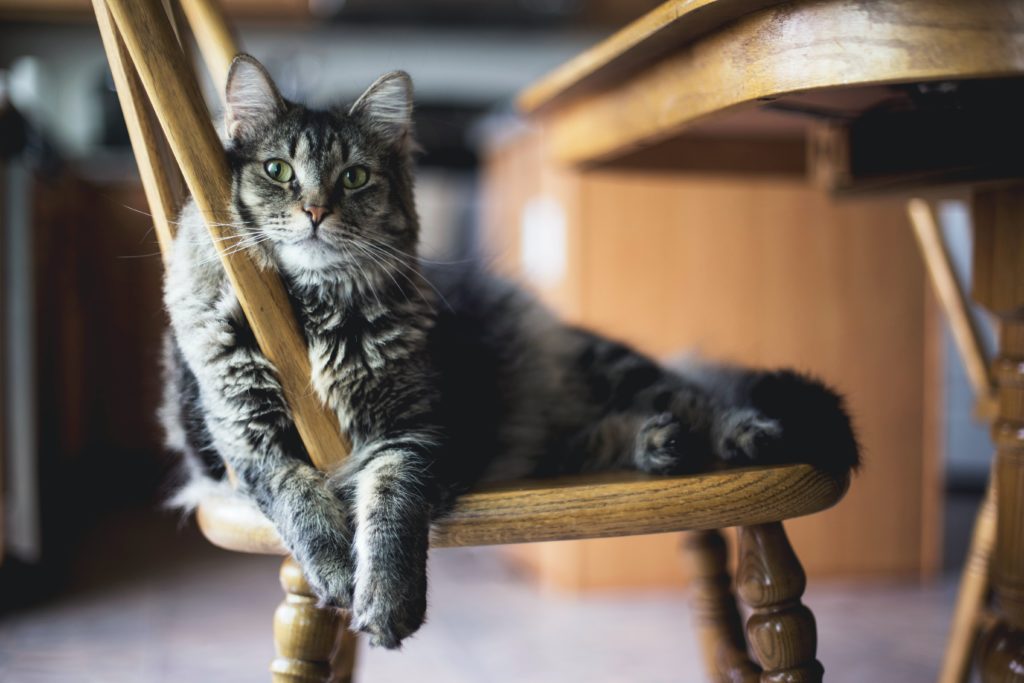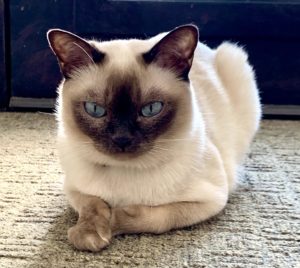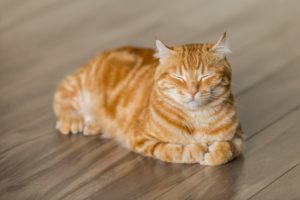Building Your Cat’s Holistic Toolkit

More and more cat parents are being disappointed with the results they get with conventional medicine. As a result there is a growing interest in using a holistic approach to their cats’ health. While I’m a firm believer there is a time a place for conventional medicine, using a complimentary approach to overall health can provide more options. Because so many people are not sure where to start here are some concrete ideas for building your own cat’s holistic health toolkit.
Holistic toolkit basics
For starters, when it comes to building a holistic toolkit let’s think foundational: nutrition. Feeding a species appropriate, quality meat-based wet diet is essential to your cat’s overall health. In fact, the appropriate diet can help reverse and avoid so many health issues and even diseases. Ingredients to avoid include corn, wheat, soy, by products, legumes (pea products, lentils, beans), carrageenan, food dyes, and toxic preservatives like BHT, BHA, propylene glycol, propyl gallate, and ethoxyquin. You simply must start reading the pet food labels!
In addition to great nutrition, use supplements that provide specific, targeted support based on your cat’s health history.
Antioxidants provide protection against damaging free radicals and fight inflammation. Examples include:
- Omega 3 oil like krill, salmon, sardine, anchovy, and algae.
- Vitamin C
- Turmeric/curcumin
Digestive enzymes can be a tremendous help for cats with a history of digestive or endocrine issues. Enzymes help break down and assimilate the food so that it can be used by the body.
Probiotics can be really beneficial for some cats with an imbalanced immune system. This is because over 70% of the immune system is in the gut! Look for a product with multiple strains of bacteria and don’t forget to rotate brands in order to provide more diversity. Additionally, keep in mind that giving a probiotic constantly may not be in your cat’s highest good because it may lead to an imbalance, or Small Intestinal Bacterial Overgrowth (SIBO). Therefore, pulsing their use on and off can be a better strategy. In some cases, if leaky gut is suspected, using a product that restores the integrity of the intestinal walls is also imperative. I recommend Ion Gut Support for Pets by Ion Biome.

Holistic tools for targeted and seasonal support
So many cats today struggle with seasonal allergies of some kind. If this is your cat’s situation, keep a supplement or two on hand that helps promote a normal histamine response. Herbs like Quercetin (nature’s Benadryl), nettle, licorice root, burdock root and eyebright are commonly used for allergy support.
Homeopathy can also be an easy way to provide relief for allergy symptoms, too. Common remedies include Euphrasia, Natrum Muraticum, Pulsatilla, Arsenicum, Allium Cepa, Sabadilla and Sulphur. (30C or 200ck potency) Other homeopathic remedies to keep handy are Arsenicum Album (vomiting), Nux Vomica (diarrhea or vomiting) Arnica (bleeding or post-surgery pain), Lycopodium, Cantharis, Pulsatilla (UTI) and Apis Mellifica (allergic reactions). To determine which remedy is needed do an internet search for the specific type of allergy; then match the description of your cat’s symptoms as closely as possible. Note: you’ll find more information by searching remedies for people, not pets.
Detoxing the liver 3-4 times per year also helps keep the liver healthy and functioning optimally. The liver is perhaps the most important organ in the body as its job is to filter all the toxins from the blood and move it out of the body via the lymphatic system. Use a milk thistle supplement for one week every 3-4 months.
For cats whose immune systems are compromised or weakened use medicinal mushrooms. These are highly recommended by integrative vets to strengthen the body’s immune system. Look for mushroom blends that include Reishi, Turkey Tail, Lion’s Mane, Cordyceps, and Chaga.
If you notice an infection developing, ie: skin, nasal, conjunctivitis, having a supplement on hand that is antibacterial can be a great replacement for antibiotics. The key is starting treatment right away so that you don’t end up with a serious condition on your hand that requires medical intervention. My go-to products would be colloidal silver (topical) or OxyCat by Feline Essential.
Vaccine detox tools
One of the most important tools to add to your cat’s holistic toolkit are ways to detox vaccines, especially if you live in an area where vets refuse to treat your cat without them. Over-vaccination is a huge problem and causes acute illness and chronic disease in pets now more than ever. If at all possible ask for a titer test before automatically re-vaccinating. A titer measures the level of antibodies in the blood that can rally a response if exposed to a disease. If you must vaccinate your cat for whatever reason, be prepared in advance! Keep these on hand so that you can begin the detox process as soon as the vaccine is given.
- Thuja 30C homeopathic remedy–used after the FVRCP vaccine. Give 3 doses, each dose about 12 hours apart.
- Lyssin 30C homeopathic remedy–used after a rabies vaccine. Give 3 doses, each dose about 12 hours apart.
- Milk thistle herbal supplement–use for 10 days to support the liver as it removes the toxins from the body.
To prepare a remedy dissolve 3 pellets in about 1/2 cup of purified or filtered water. Using a syringe, withdraw 1/2 ml; cover the tip with your finger, and strike it hard against your other palm about 10-12 time. This energizes the remedy and makes it more effective. Simply squirt into the side of the cat’s mouth, or add to a small amount of wet food, a treat, broth or cream. Cover the remedy and reuse it for up to 5 days. Once the symptoms stop be sure to stop the remedy. If the symptoms resume give another dose and continue to monitor symptoms.
One final thought about vaccine detox remedies. If your cat has had multiple vaccines of any kind that have never been detoxed then I recommend using a 200ck potency and giving a total of 4 doses (twice a day for 2 days).
Tools for addressing stressful situations
A holistic toolkit wouldn’t be complete without options to combat stress. Cats like routine, and anything out of their “norm” can be very stressful. Keeping a few items on hand that help calm your cat in stressful situations will make the experience better for both of you. In addition, emergencies situations can arise, too, so it’s best to prepare in advance.
Color therapy uses the energetic vibration of color to reduce stress and promote emotional and physical healing. Take an article of clothing, blanket, towel or object and place on or near the cat’s favorite sleeping spots. You can also place this item in the carrier for vet trips. A cat collar also works!
- Green–promotes a sense of security and being grounded (ie: fighting or aggression with other cats, pets, or adjusting to a new home, environment)
- Pink–promotes healing (ie: post-surgery, illness)
- Baby blue–reduces anxiety and is very calming (ie: car trips, vet visits)
- Red–helps support the root chakra and addresses the need to feel safe and secure
- Purple–perfect for nervous, anxious pets
- Yellow–ideal for promoting cheerfulness, when a pet is sad or depressed, or needs solar plexus chakra support
CBD, or cannabidiol, has been show to be very effective in helping to calm cats who are stressed out. Even cats have their own endocannabinoid system, so CBD products, including oils and chews, work naturally with the body. I normally find that a CBD product with 150-300 mg works well for stress-related issues.
Flower essences like Bach Flower Rescue Remedy can be highly effective in helping to calm a highly stressed out cat. Keep in mind that you may need to dose it every 15 minutes until the cat responds. Apply 4 drops topically or try to rub some drops on the gums or around the face/mouth.
Create an herb garden for your cat to self select herbs to support your cat on an emotional, physical or spiritual level. Place a tablespoon of the herbs on a small towel so that your cat can decide which one or more is needed to provide support. A wink, yawn, stretch, sniff can indicate the herb is helping to shift the energy. Some cats will nibble, sit on, or face the herb that best suits their needs. This process is fascinating to watch. To learn more about herb gardens and which herbs to use be sure to get a copy of The Aromatic Cat by Julie-Anne Thorne.
Professional resources for your toolkit
Another way to be proactive is to know which professional resources you can use just in case they become necessary. For example, research to see if there is an integrative veterinary clinic that offers chiropractic, Traditional Chinese medicine, herbalism or acupuncture services. Is there a homeopathic vet either locally or can you find one who does remote appointments? Services like Reiki, animal communication and muscle testing can also be good to source in advance, too. Finally, keep the name, address and phone number of an emergency veterinary hospital handy, too. If you’re having an emergency the last thing you need to worry about is where you can take your cat. To find a holistic or integrative vet in your area you can search the ahvma.org website or search online for other veterinary professional groups for Chinese medicine, homeopathy, etc.
Make the most of your toolkit by muscle testing
Muscle testing, or applied kinesiology, can be the quickest, most accurate way to determine exactly what your cat’s body needs. We all have an intuitive ability, so if you don’t know how to muscle test something for your cat, listen to your intuition…and follow your gut. While I believe there’s a time and place for conventional medicine, alternative and complementary medicine can offer great benefits that are safe, non-toxic, and give amazing results. Therefore, why not start building your holistic toolkit today and provide more options to give your cat a long, healthy life?


